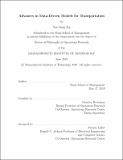| dc.contributor.advisor | Dimitris Bertsimas. | en_US |
| dc.contributor.author | Ng, Yee Sian. | en_US |
| dc.contributor.other | Massachusetts Institute of Technology. Operations Research Center. | en_US |
| dc.date.accessioned | 2019-09-16T18:17:41Z | |
| dc.date.available | 2019-09-16T18:17:41Z | |
| dc.date.copyright | 2019 | en_US |
| dc.date.issued | 2019 | en_US |
| dc.identifier.uri | https://hdl.handle.net/1721.1/122100 | |
| dc.description | This electronic version was submitted by the student author. The certified thesis is available in the Institute Archives and Special Collections. | en_US |
| dc.description | Thesis: Ph. D., Massachusetts Institute of Technology, Sloan School of Management, Operations Research Center, 2019 | en_US |
| dc.description | Cataloged from student-submitted PDF version of thesis. | en_US |
| dc.description | Includes bibliographical references (pages 163-176). | en_US |
| dc.description.abstract | With the rising popularity of ride-sharing and alternative modes of transportation, there has been a renewed interest in transit planning to improve service quality and stem declining ridership. However, it often takes months of manual planning for operators to redesign and reschedule services in response to changing needs. To this end, we provide four models of transportation planning that are based on data and driven by optimization. A key aspect is the ability to provide certificates of optimality, while being practical in generating high-quality solutions in a short amount of time. We provide approaches to combinatorial problems in transit planning that scales up to city-sized networks. In transit network design, current tractable approaches only consider edges that exist, resulting in proposals that are closely tethered to the original network. We allow new transit links to be proposed and account for commuters transferring between different services. In integrated transit scheduling, we provide a way for transit providers to synchronize the timing of services in multimodal networks while ensuring regularity in the timetables of the individual services. This is made possible by taking the characteristics of transit demand patterns into account when designing tractable formulations. We also advance the state of the art in demand models for transportation optimization. In emergency medical services, we provide data-driven formulations that outperforms their probabilistic counterparts in ensuring coverage. This is achieved by replacing independence assumptions in probabilistic models and capturing the interactions of services in overlapping regions. In transit planning, we provide a unified framework that allows us to optimize frequencies and prices jointly in transit networks for minimizing total waiting time. | en_US |
| dc.description.statementofresponsibility | by Yee Sian Ng. | en_US |
| dc.format.extent | 176 pages | en_US |
| dc.language.iso | eng | en_US |
| dc.publisher | Massachusetts Institute of Technology | en_US |
| dc.rights | MIT theses are protected by copyright. They may be viewed, downloaded, or printed from this source but further reproduction or distribution in any format is prohibited without written permission. | en_US |
| dc.rights.uri | http://dspace.mit.edu/handle/1721.1/7582 | en_US |
| dc.subject | Operations Research Center. | en_US |
| dc.title | Advances in data-driven models for transportation | en_US |
| dc.type | Thesis | en_US |
| dc.description.degree | Ph. D. | en_US |
| dc.contributor.department | Massachusetts Institute of Technology. Operations Research Center | en_US |
| dc.contributor.department | Sloan School of Management | |
| dc.identifier.oclc | 1119538884 | en_US |
| dc.description.collection | Ph.D. Massachusetts Institute of Technology, Sloan School of Management, Operations Research Center | en_US |
| dspace.imported | 2019-09-16T18:17:39Z | en_US |
| mit.thesis.degree | Doctoral | en_US |
| mit.thesis.department | Sloan | en_US |
| mit.thesis.department | OperRes | en_US |
